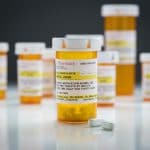- What Is Fentanyl?
- Effects Of Fentanyl
- Fentanyl Addiction Warning Signs
- Fentanyl Addiction Treatment
- FAQs
Fentanyl is a powerful and dangerous synthetic opioid that is up to 100 times more potent than morphine. When prescribed by a doctor, fentanyl is used to treat severe pain that doesn’t respond to alternative pain relievers.
Fentanyl is a schedule II controlled substance that’s highly addictive and comes with a high risk of overdose if abused. If you think you or a loved one has an opioid use disorder (OUD), professional treatment can help you build a foundation of skills for long-term recovery.
What Is Fentanyl?
Fentanyl is a prescription drug sold as lozenges, or transdermal patches under the brand names Duragesic, Actiq, and Sublimaze.
Drug dealers often use illicit fentanyl as an adulterant in commonly abused drugs like heroin and methamphetamine. Fentanyl may also be known by its street names, which include China Girl, Dance Fever, and Goodfellas.
Although it can be beneficial for severe or cancer-related pain, it is dangerous if misused. Fentanyl is associated with a significant increase in opioid overdose deaths. According to the Drug Enforcement Administration (DEA), overdose deaths involving fentanyl increased more than 50% in the past year.
Effects Of Fentanyl
Fentanyl is a central nervous system depressant that slows important brain functions like breathing and heart rate. It attaches to opioid receptors in the brain to relieve pain and increases the production of dopamine.
Along with pain relief, fentanyl can also produce euphoria, relaxation, and sedation.
Similar to other opioids, fentanyl may also cause unwanted side effects, including:
- constipation
- nausea
- vomiting
- confusion
- drowsiness
Learn more about the Side Effects Of Fentanyl
Fentanyl Overdose
When fentanyl is mixed with other opioids or depressant drugs, like benzodiazepines, it increases these effects and the risk of overdose.
Signs of fentanyl overdose include:
- slow or shallow breathing
- slow heart rate
- low blood pressure
- mental confusion
- bluish skin tone
- loss of consciousness
A fentanyl overdose can be fatal and requires immediate medical care. If you have Narcan (naloxone), you can use it while you wait for help to arrive. However, fentanyl may require more than one dose of Narcan to reverse the effects of an overdose.
Learn more about Fentanyl Overdose
Fentanyl Dependence & Withdrawal
Fentanyl abuse is becoming increasingly more prevalent, despite the life-threatening risks associated with it.
Fentanyl patches and other forms of the drug may be misused if taken in a way other than how it is prescribed. Illicit forms of the drug, including fentanyl powder may be abused or mixed with other drugs to increase the effects.
Long-term fentanyl use can cause changes in the brain that lead to a dependence on the drug. If you stop taking opioids or try to reduce the amount used, you may experience withdrawal symptoms.
Fentanyl withdrawal symptoms may include:
- muscle aches
- bone pain
- trouble sleeping
- diarrhea
- goosebumps
- intense cravings
Fentanyl Addiction Warning Signs
Dependence increases the risk of developing a substance use disorder (SUD), also known as addiction. If you are concerned about fentanyl abuse, there are several physical and behavioral changes that can help you determine if professional treatment may be necessary.
Warning signs of drug addiction may include:
- desire to cut back but unable to stop on your own
- loss of control over how much you use
- continued use, despite physical/mental health consequences
- prioritizing drug use over relationships
- loss of interest in other activities or hobbies
- dependence and withdrawal symptoms
Fentanyl Addiction Treatment
Although fentanyl is a potent opioid and highly addictive, professional addiction treatment can help you stop using drugs. When you are ready to reach out for help, a healthcare professional can connect you with the level of care that is right for you.
Depending on your needs, your treatment plan may include:
Detox
If you are dependent, a detox program may be necessary to stabilize physical withdrawal symptoms and prepare you for a drug rehab program. During a detox program, you will have 24/7 supervision and may receive medications to ease severe symptoms.
Medication-Assisted Treatment (MAT)
MAT programs consist of FDA-approved medications, like methadone and buprenorphine, along with behavioral therapy.
According to the Substance Abuse and Mental Health Services Administration (SAMHSA), MAT programs can effectively treat opioid addiction, help individuals maintain long-term recovery, and reduce the risk of overdose.
Residential Treatment
Residential treatment programs, also known as inpatient rehab, involve an intensive daily schedule of individualized treatment services. Therapies and activities may include behavioral therapy, counseling, and meditation.
Outpatient Treatment
Outpatient rehab is a flexible alternative to inpatient treatment. You will live at home and travel to scheduled treatment sessions. Each treatment session will be tailored to your needs and may include individual counseling, group therapy, or family therapy.
Northeast Addictions Treatment Center offers a wide range of comprehensive outpatient treatment options. To learn more about our treatment center, please contact an addiction specialist today.
FAQs
When Was Fentanyl First Developed?
Fentanyl was developed in Belgium in 1959 by the pharmacist Paul Janssen, of Janssen Pharmaceutica. It entered clinical practice in 1968 and is the most common synthetic opioid analgesic in use as of 2022.
Learn more about The Origin & History of Fentanyl
Is Fentanyl An Opiate?
No, fentanyl is not an opiate because it is made in a lab with man-made substances and is not directly derived from the opium plant. Therefore, fentanyl is considered a synthetic opioid.
To learn more, read Is Fentanyl An Opiate?
Is Fentanyl An Opioid?
Yes, fentanyl is classified as a synthetic opioid analgesic. It is a powerful medication used for pain relief that has a high potential for abuse and addiction.
To learn more, read Is Fentanyl An Opioid?
Is Fentanyl Legal?
Fentanyl is available as a prescription opioid analgesic (painkiller) to treat severe or chronic pain. However, it is also produced in illicit laboratories and sold as a powder, nasal spray, or pressed into prescription drugs and sold as counterfeit pills.
Both forms of the drug are highly potent and can be lethal if misused.
Learn more about Legal Vs. Illegal Fentanyl
What Does Fentanyl Look Like?
The look of fentanyl varies depending on the form. It can come in a tablet, liquid, lozenge, or powder form. It can be white, clear, red, pink, or even brown in color.
To learn more, read What Does Fentanyl Look Like?
What Does Fentanyl Taste Like?
Fentanyl may taste like sugar or be tasteless. It can also take on the taste of the drugs it is mixed with, and people who take illicit drugs may ingest high amounts of fentanyl without knowing.
To learn more, read What Does Fentanyl Taste Like?
What Does Fentanyl Smell Like?
Fentanyl does not have a distinctive smell. There is also no way to identify fentanyl in an illicit substance through your senses alone. Fentanyl test strips and laboratory testing are the only reliable ways to determine if fentanyl is present or not.
To learn more, read What Does Fentanyl Smell Like?
What Is A Lethal Dose Of Fentanyl?
A lethal dose of fentanyl can change from person to person and there is no exact amount that is lethal to everyone. However, the DEA considers 2 milligrams of fentanyl to be lethal.
Learn more about the Lethal Dose Of Fentanyl
How Many Fentanyl Deaths Were Recorded In 2020?
Synthetic opioids were the primary cause of death in around 56,000 U.S. overdose victims in 2020. Almost all of these deaths can be attributed to fentanyl.
Learn more about Fentanyl-Related Deaths In 2020
Is There An Antidote For Fentanyl Overdose?
Yes, naloxone can act as an antidote for fentanyl overdose by restoring breathing. It is available as an intravenous liquid or nasal spray under the brand name Narcan.
Learn more about the Fentanyl Overdose Antidote
What Are Fentanyl Analogs?
Fentanyl analogs, like carfentanil and acetyl fentanyl, are illicit drugs that are chemically similar to fentanyl, an opioid prescription pain reliever.
They mimic the effects of fentanyl, including euphoria, pain relief, and drowsiness, but can be significantly stronger and have contributed to a rise in overdose deaths.
Learn more about Fentanyl Analogs
What Are Fentanyl Test Strips?
Fentanyl test strips are a way to test whether illicit drugs contain any fentanyl. They can stop people from using contaminated drugs and prevent overdoses related to fentanyl and other synthetic opioids.
Learn more about Fentanyl Test Strips
Can You Smoke Fentanyl?
Yes, fentanyl can be smoked. It is a synthetic opioid that is available in a transdermal patch, lozenge, or tablet. The liquid from the patch can be heated and smoked, and the powdered form of illicit fentanyl can be smoked as well.
Learn more about the Effects Of Smoking Fentanyl
What Are The Side Effects Of Fentanyl Injection?
Some of the side effects of fentanyl injection include immediate heavy sedation and feelings of relaxation. However, abscesses on the skin, collapsed veins, dependency, and overdose can also occur if you inject fentanyl without medical supervision.
Learn more about Injecting Fentanyl
What Is Fentanyl Citrate?
Fentanyl citrate is the citrate salt of the powerful opioid drug fentanyl, which has a potency between 50 and 100 times greater than morphine. It is often used to provide additional analgesia (pain relief) for opioid-tolerant individuals experiencing severe breakthrough pain.
Learn more about Fentanyl Citrate
Is There A Liquid Version Of Fentanyl?
There are many legal and illicit liquid versions of fentanyl. These versions include injectable fentanyl citrate, nasal sprays, transdermal patches, and illicit concentrations.
Learn more about Liquid Fentanyl
Is Fentanyl Synthetic?
Fentanyl is a synthetic opioid, which means it’s made in a lab instead of being directly derived from the opium plant. According to the CDC, synthetic opioids are mostly responsible for opioid-related overdoses that result in death.
To learn more, read Is Fentanyl Synthetic?
How Much Does Fentanyl Cost?
On the street, fentanyl usually costs between $150 and $200 per gram. It often costs less in big cities compared to more rural areas.
When prescribed by a doctor, fentanyl typically costs between $150 and $6,000 per prescription. The exact price depends on the formulation, dosage, pharmacy, and insurance.
Learn more about Fentanyl Prices
What Is Fentanyl Nasal Spray?
Fentanyl nasal spray is an opioid medication used to treat breakthrough pain, which is a sudden flare of pain in people on pain management therapy. Intranasal administration allows the medication to relieve pain quickly.
Although the medication wears off quickly, intranasal fentanyl has a high risk of abuse and overdose.
Learn more about Fentanyl Nasal Spray
Can You Snort Fentanyl?
Yes, fentanyl can be snorted. However, snorting fentanyl can lead to more intense side effects and an increased risk of overdose.
Learn more about Snorting Fentanyl
Sources
Written by
Northeast Addition Editorial Team
©2024 Northeast Addition Center | All Rights Reserved
This page does not provide medical advice.




